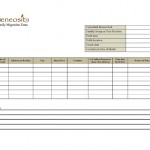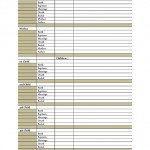Table of Contents
- Introduction
- Uncovering Your Family History: Tips for Starting Your Genealogy Research
- How to Use Online Resources to Trace Your Family Tree
- Understanding the Basics of Genealogical Records and Documentation
- Strategies for Overcoming Common Genealogy Research Challenges
- Exploring the Benefits of DNA Testing for Genealogy Research
- Tips for Organizing and Preserving Your Genealogy Research Findings
- Conclusion
Introduction
Welcome to the Genealogy for Beginners Guide! This guide is designed to help you get started with genealogy research. Whether you are just starting out or have been researching your family history for years, this guide will provide you with the tools and resources you need to begin your journey. We will cover topics such as how to get started, where to find records, and how to organize your research. We will also discuss the importance of preserving your family history and how to share your discoveries with others. So let’s get started!
Uncovering Your Family History: Tips for Starting Your Genealogy Research
Are you interested in uncovering your family history? Beginning genealogy research can be a rewarding and fascinating journey. With the right tools and resources, you can uncover a wealth of information about your ancestors and their lives. Here are some tips to help you get started on your genealogy research.
1. Gather Information: Start by gathering as much information as you can from family members. Ask questions about your family’s history and take notes. Make sure to ask about names, dates, and places.
2. Research Online: There are many online resources available to help you with your genealogy research. Websites such as Ancestry.com and FamilySearch.org are great places to start. These sites offer access to records such as birth, marriage, and death certificates, as well as census records.
3. Visit Local Archives: Local archives are a great source of information for genealogy research. Visit your local library or historical society to access records such as birth and death certificates, newspaper articles, and other documents.
4. Join a Genealogy Group: Joining a genealogy group can be a great way to connect with other researchers and learn more about your family history. Many genealogy groups offer workshops and seminars to help you get started. Genealogy for beginners tip: Join a local genealogical society if a large branch of your family is from a generalized area such as a city or county. Members of these groups are very good at locating information and records that you won’t be able to find on your own.
5. Document Your Research: As you uncover information about your ancestors, make sure to document your research. Keep track of the sources you use and the information you find. This will help you stay organized and make it easier to find information in the future.
By following these tips, you can begin your journey into uncovering your family history. With the right resources and dedication, you can uncover a wealth of information about your ancestors and their lives.
How to Use Online Resources to Trace Your Family Tree
Tracing your family tree can be a rewarding and fascinating experience. With the help of online resources, it is now easier than ever to uncover your family’s history. Here are some tips to help you get started.
First, create a family tree. Start with yourself and work your way back, adding as much information as you can. Include names, dates, and locations. This will help you to organize your research and keep track of your progress. You may have all of the general information to begin some of the really interesting work already. Document your basic family tree on a form like the Blank Family Tree. You’ll need the exact names and dates in front of you because there will be lots of people with the same and similar names that you will need to rule out.
Next, search for records online. There are many websites that offer access to public records, such as birth, marriage, and death certificates. You can also search for census records, military records, and immigration records. These records can provide valuable information about your ancestors. If your family is from various countries there are dedicated websites and forums that specialize in these.
Another useful resource is genealogy websites. These websites allow you to search for other people who are researching the same family lines as you. You can connect with them and share information.
Finally, consider visiting local archives and libraries. These places often have records that are not available online. They may also have knowledgeable staff who can help you with your research.
By using these online resources, you can trace your family tree and uncover the stories of your ancestors. With a little patience and dedication, you can uncover a wealth of information about your family’s past.
Genealogy for Beginners: Understanding the Basics of Genealogical Records and Documentation
Genealogical records and documentation are essential for anyone interested in researching their family history. These records provide a wealth of information about an individual’s ancestors, including their names, dates of birth, marriage, and death, as well as other important details. Understanding the basics of genealogical records and documentation is key to successful family history research.
Genealogical records are documents that provide information about an individual’s ancestors. These records can include birth, marriage, and death certificates, census records, military records, immigration records, land records, wills, and other documents. Each type of record provides different types of information, and it is important to understand the types of records available and how to access them.
Documentation is the process of verifying the accuracy of the information found in genealogical records. Documentation is essential for ensuring that the information found in records is accurate and reliable. Documentation can include primary sources, such as original documents, as well as secondary sources, such as published books and articles.
When researching family history, it is important to use both genealogical records and documentation to ensure accuracy. It is also important to keep track of the sources used in the research process. This can be done by creating a research log or bibliography. This will help to ensure that the research is thorough and that the information found is reliable.
By understanding the basics of genealogical records and documentation, anyone interested in researching their family history can be successful. With the right resources and a bit of patience, anyone can uncover the secrets of their family’s past.
Strategies for Overcoming Common Genealogy Research Challenges
Genealogy research can be a rewarding and exciting experience, but it can also be challenging. Here are some strategies for overcoming common genealogy research challenges:
1. Lack of Records: Many records have been lost or destroyed over time, making it difficult to trace family history. To overcome this challenge, look for alternative sources of information such as newspaper articles, church records, and family stories.
2. Difficult to Read Records: Many records are written in old handwriting or in a language that is difficult to read. To overcome this challenge, use online tools such as handwriting recognition software or translation services.
3. Unreliable Sources: It can be difficult to determine the accuracy of some sources. To overcome this challenge, look for multiple sources that corroborate each other.
4. Limited Time: It can be difficult to find the time to do genealogy research. To overcome this challenge, set aside a specific amount of time each week to work on your research.
5. Overwhelmed by Information: It can be difficult to make sense of all the information you find. To overcome this challenge, create a research plan and organize your information into a family tree.
Genealogy for Beginners tip: You may be on the wrong track if something doesn’t make sense or doesn’t seem right. Go backwards to check earlier research when connections don’t add up. You could have been tracing the wrong person with the same name as your ancestor. Enter your primary individuals into a Genealogy Proof Sheet to document how you verified an individual’s information and determine if the information is valid.
By following these strategies, you can overcome common genealogy research challenges and make the most of your research.
Exploring the Benefits of DNA Testing for Genealogy Research
DNA testing has become increasingly popular in recent years as a tool for genealogy research. This technology has revolutionized the way people can trace their family history, providing a wealth of information that was previously unavailable. By exploring the benefits of DNA testing for genealogy research, individuals can gain a better understanding of their ancestry and uncover new insights into their family’s past.
One of the primary benefits of DNA testing for genealogy research is the ability to identify distant relatives. By comparing the DNA of two individuals, it is possible to determine how closely related they are. This can be especially useful for individuals who are trying to trace their family tree but have hit a dead end. By testing the DNA of potential relatives, they can determine if they are related and, if so, how closely.
Another benefit of DNA testing for genealogy research is the ability to identify ethnic origins. By analyzing an individual’s DNA, it is possible to determine their ancestral origins and trace their family’s migration patterns. This can be especially useful for individuals who are interested in learning more about their family’s history and cultural heritage.
Finally, DNA testing can also provide valuable insights into an individual’s health. By analyzing an individual’s DNA, it is possible to identify genetic markers that may indicate an increased risk of certain diseases or conditions. This can be especially useful for individuals who are interested in taking proactive steps to protect their health.
In conclusion, DNA testing has revolutionized the way people can trace their family history. By exploring the benefits of DNA testing for genealogy research, individuals can gain a better understanding of their ancestry and uncover new insights into their family’s past.
Tips for Organizing and Preserving Your Genealogy Research Findings
1. Create a filing system: Establish a filing system that works for you. This could include physical folders, digital folders, or a combination of both. Label each folder with the name of the ancestor or family group you are researching.
2. Make copies: Make copies of all documents, photos, and other items related to your research. This will help to preserve the originals and provide you with a backup in case of loss or damage.
3. Store originals safely: Store original documents, photos, and other items in acid-free folders or boxes. This will help to protect them from damage caused by light, humidity, and other environmental factors.
4. Cite your sources: Always cite your sources when writing up your research findings. This will help you to remember where you found the information and will also help other researchers who may be looking for the same information.
5. Use a genealogy software program: Using a genealogy software program can help you to organize and store your research findings in an efficient manner. It can also help you to create charts and reports that can be used to share your research with others.
6. Back up your data: Back up your data regularly to ensure that it is not lost in the event of a computer crash or other disaster.
7. Share your research: Consider sharing your research with other genealogists. This can help to expand your research and provide you with new insights.
8. Take notes: Take notes as you research. This will help you to remember important details and will also help you to keep track of your research progress.
9. Join a genealogy society: Joining a genealogy society can provide you with access to resources and other genealogists who can help you with your research.
10. Have fun: Above all, have fun with your research. Enjoy the process of uncovering your family history and learning more about your ancestors.
Conclusion
The Genealogy for Beginners Guide is a great resource for anyone interested in researching their family history. It provides a comprehensive overview of the different types of records available, the best ways to search for them, and the tools and techniques needed to analyze and interpret the data. With the help of this guide, anyone can get started on their genealogy research journey and uncover the stories of their ancestors.



